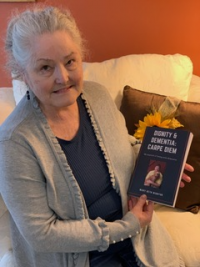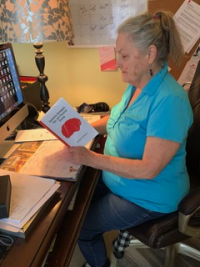Redirection Strategies and People Living with Dementia
In honour of September being Alzheimer’s Awareness Month, we are sharing strategies commonly referred to as redirection and insights for interacting with persons living with dementia from a Canadian woman with lived experience. Myrna Norman is an advocate, author, speaker, mother, wife, and grandmother who was diagnosed with frontotemporal dementia in 2009. Her diagnosis has since shifted to Alzheimer's, Lewy body dementia, and most recently, to mild cognitive impairment.

To Redirect is to lead, and people prefer to follow someone they trust and enjoy, not someone who shames or frightens them.
Stick to a calm, friendly tone.
Make sure your body language follows suit.
A warm smile, eye contact, a light touch and relaxed posture, make the listener more open to your suggestions than if you frown or hunch your shoulders.
You can also use body language to guide the person - an arm around a shoulder, a hand outstretched in invitation.

Ask questions to learn more.
Although "redirect” is an action word, bide a little time gathering a better understanding of underlying feelings or the situation.
When you have a sense of where the person is coming from, emotionally and physically, you have a better idea of how to best redirect.
You are also better able to be reassuring - and your empathy in turn makes the person feel understood, and therefore be more receptive to you.
Great words, but how to accomplish this?
1. Ask yourself these questions:
Is the person bored? Some people like to keep their hands busy.
Is the person upset about something? Bad memories or incidents from past?
Is there something in the room or the situation that triggers them to feel upset like this?
2. Questions you could ask the person:
Do you need to go to the bathroom?
Is there something I could get for you?
Are you cold or tired or hungry?
Can I help you find something?
What can I do to help with that?
Tell me more.
3. Empathize, don’t argue.
Avoid arguing or expecting the person to remember what you said:
“Don’t do that, you’ll fall!” or “There is no such thing as what you are explaining - they are all in your head!”
People with dementia lose the ability to understand complicated phrases without having ideas broken down into smaller pieces, so this isn’t an effective motivator. Instead, it only makes them defensive - they retreat, when your goal is to get them to move forward.
Be reassuring and agreeable. It’s okay to go along with the person’s different reality.
You don’t have to be as blatant as to say, “I see the little creatures too”, but you can be empathetic, saying: “Yes, I know they really upset you” or “Why do you think they are so pesky?”

4. Try bridge phrases:
Bridge phrases are expressions that help to move things to a new place.
These turns of phrase are especially useful when someone is stuck in a particular conversational loop when they ask the same question over and over again. You might say something like:
The mail hasn’t come - that reminds me of when Grandpa said he had milk and ice delivered to the door. Did you have a milkman?
I like that story. I’ve also heard that…
It’s such a nice day. Why don’t we walk outside to see if any birds are around?
I know those little creatures are upsetting. What I’d really like to know is why they’re so quiet. Do you think the cat hears them?
5. Introduce a diversion without belabouring the reason for it:
Examples include:
“Hey, I have an idea. Why don’t we…”
“Look at what I brought you…” or “I need your help…”
Know that boredom often fuels repetitive behaviour.
Help people feel purposeful, such as folding towels, picking up sticks in the garden, sorting papers, or using worry beads, yarn to unwind and rewind, or a drawer or a toolbox to organize. Such an activity helps with persons with inappropriate touching or skin picking.
If the problem is anxiety, try to engage the person in something pleasant.
Three successful themes for restless behaviours involve: 1) music, like playing an iPod, 2) comedy, like an old slapstick movie, or 3) touch, such as petting an animal. Sometimes just sitting and holding hands is soothing.

~ Post by Myrna Norman